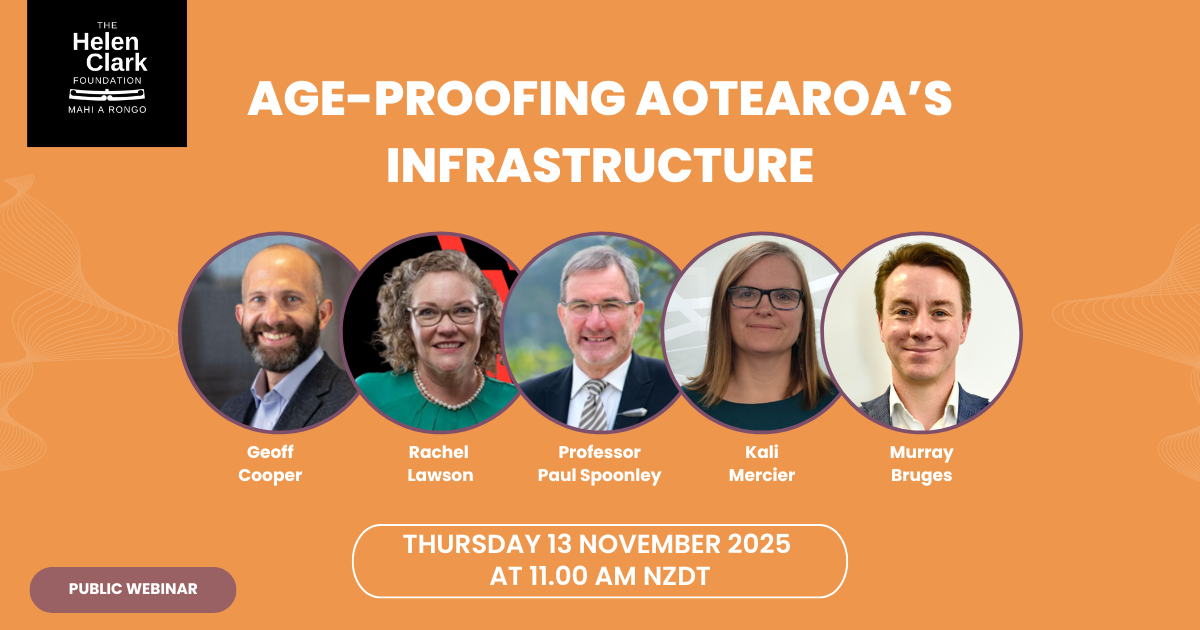This is a public webinar. You can register here.
This webinar will discuss our recent report, Age-proofing Aotearoa. You can read the report here.
New Zealand is experiencing rapid change in its population and demographics. Today, around 17 per cent of the population is over 65; by 2078, up to one third of the population may be 65 or older. Just how prepared is the country to cater for a potential 700,000 more people aged over 65 in the next twenty five years?
Our latest report with WSP in New Zealand, Age-proofing Aotearoa: Rethinking our infrastructure for an ageing population, explores the impact of this transformative demographic change on the country’s infrastructure needs. It investigates the implications for health, housing, aged care, transport and urban design, and provides practical policy recommendations for how we can best prepare for this shift, with a focus on achieving equitable outcomes for all.
Our expert panellists will cover the key findings of the report and share their expertise about how the country needs to be responding to what is both a generational challenge, and an opportunity to design cities that work better for everyone.
The speakers:
Geoff Cooper
Chief Executive, Te Waihanga
Geoff has a background in global policy having worked for the United States Federal Reserve, the European Bank for Reconstruction & Development and the United Nations. He is a former Chief Economist for both PwC and Auckland Council, where he worked on infrastructure, housing, regulation and financial policy, including business case development for Auckland’s City Rail Link. At Te Waihanga, Geoff was previously the General Manager of Strategy where he had purview over research capabilities, the National Infrastructure Pipeline, and development of the New Zealand Infrastructure Strategy. He holds a Master of Economics with First Class Honours from the University of Auckland and a Master of Public Affairs from Princeton University.
Rachel Lawson
Head of Planning, WSP
Rachel Lawson is Head of Planning at WSP and a member of its Earth & Environment Leadership Team. With a deep belief that infrastructure is more than physical assets – it’s the platform for human potential – Rachel is driven by connecting stakeholders, challenging assumptions, and delivering future-ready solutions that help people live well at every stage of life. As part of a team committed to long-term impact, she sees infrastructure as a catalyst for thriving communities and invites you to join the conversation about shaping a bright future for Aotearoa New Zealand.
Professor Paul Spoonley
Professor Emeritus
Distinguished Professor Emeritus Paul Spoonley was previously Pro Vice-Chancellor of the College of Humanities and Social Sciences at Massey University. Once he stepped down, he was appointed to advise the Police Commissioner (2022-25) and as Co-Director of the National Centre for Countering Violent Extremism (2022-23).
Paul is a Fellow of the Auckland Museum and a Board member and a Research Fellow at the Max Planck Institute for the Study of Religious and Ethnic Diversity, Germany. He was awarded the Science and Technology Medal by the Royal Society (2009) for cross-cultural understanding and he was a Fulbright Senior Scholar at the University of California Berkeley. He is also a Fellow of the Royal Society of New Zealand.
In 2025, he was made an Officer of the New Zealand Order of Merit.
He is the author or editor of 29 books, including the The “New” New Zealand. Facing Demographic Disruption (2021) and Histories of Hate. The Radical Right in Aotearoa New Zealand (2022).
Kali Mercier
Report Author, WSP Fellow and Deputy Director, The Helen Clark Foundation
Kali is the report author and WSP Fellow and Deputy Director of the Helen Clark Foundation. Kali has an extensive background in law, policy, and international development, which has taken her to Berlin, London, Mexico City and Botswana. Before coming to the Helen Clark Foundation, Kali worked as Principal Advisor at the Ministry of Justice, Policy Director at the NZ Drug Foundation and as a human rights advocate for Amnesty UK and other charities overseas.
Murray Bruges
Executive Director, The Helen Clark Foundation
Murray Bruges is the Executive Director of the Helen Clark Foundation. Prior to the Foundation, Murray worked for Fonterra Co-operative Group in Auckland on resource management and environmental policy. From 2011 to 2020, Murray worked for the New Zealand Ministry of Foreign Affairs and Trade in a range of roles focused on trade, economic, tech and climate policy, including a three-year posting to the New Zealand Consulate General in Los Angeles. Earlier in his career, Murray worked for the Ministry of Fisheries on a range of policy issues. He lives in Auckland with his wife and son.
Read more